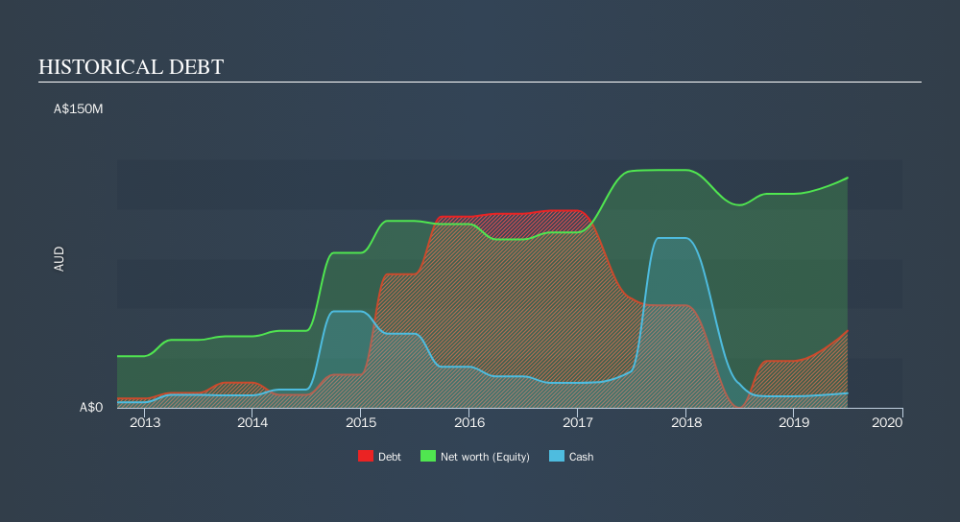Is Capitol Health (ASX:CAJ) A Risky Investment?

Some say volatility, rather than debt, is the best way to think about risk as an investor, but Warren Buffett famously said that 'Volatility is far from synonymous with risk.' So it seems the smart money knows that debt - which is usually involved in bankruptcies - is a very important factor, when you assess how risky a company is. Importantly, Capitol Health Limited (ASX:CAJ) does carry debt. But should shareholders be worried about its use of debt?
When Is Debt A Problem?
Generally speaking, debt only becomes a real problem when a company can't easily pay it off, either by raising capital or with its own cash flow. If things get really bad, the lenders can take control of the business. While that is not too common, we often do see indebted companies permanently diluting shareholders because lenders force them to raise capital at a distressed price. Of course, debt can be an important tool in businesses, particularly capital heavy businesses. The first step when considering a company's debt levels is to consider its cash and debt together.
Check out our latest analysis for Capitol Health
How Much Debt Does Capitol Health Carry?
The image below, which you can click on for greater detail, shows that at June 2019 Capitol Health had debt of AU$38.8m, up from AU$3.99m in one year. However, it also had AU$7.33m in cash, and so its net debt is AU$31.4m.
How Strong Is Capitol Health's Balance Sheet?
Zooming in on the latest balance sheet data, we can see that Capitol Health had liabilities of AU$24.6m due within 12 months and liabilities of AU$47.9m due beyond that. On the other hand, it had cash of AU$7.33m and AU$3.94m worth of receivables due within a year. So its liabilities total AU$61.2m more than the combination of its cash and short-term receivables.
Capitol Health has a market capitalization of AU$172.9m, so it could very likely raise cash to ameliorate its balance sheet, if the need arose. But we definitely want to keep our eyes open to indications that its debt is bringing too much risk.
In order to size up a company's debt relative to its earnings, we calculate its net debt divided by its earnings before interest, tax, depreciation, and amortization (EBITDA) and its earnings before interest and tax (EBIT) divided by its interest expense (its interest cover). This way, we consider both the absolute quantum of the debt, as well as the interest rates paid on it.
Capitol Health's net debt is only 1.2 times its EBITDA. And its EBIT easily covers its interest expense, being 10.4 times the size. So we're pretty relaxed about its super-conservative use of debt. Also good is that Capitol Health grew its EBIT at 14% over the last year, further increasing its ability to manage debt. The balance sheet is clearly the area to focus on when you are analysing debt. But it is future earnings, more than anything, that will determine Capitol Health's ability to maintain a healthy balance sheet going forward. So if you're focused on the future you can check out this free report showing analyst profit forecasts.
But our final consideration is also important, because a company cannot pay debt with paper profits; it needs cold hard cash. So the logical step is to look at the proportion of that EBIT that is matched by actual free cash flow. Looking at the most recent three years, Capitol Health recorded free cash flow of 45% of its EBIT, which is weaker than we'd expect. That weak cash conversion makes it more difficult to handle indebtedness.
Our View
The good news is that Capitol Health's demonstrated ability to cover its interest expense with its EBIT delights us like a fluffy puppy does a toddler. And we also thought its EBIT growth rate was a positive. It's also worth noting that Capitol Health is in the Healthcare industry, which is often considered to be quite defensive. All these things considered, it appears that Capitol Health can comfortably handle its current debt levels. On the plus side, this leverage can boost shareholder returns, but the potential downside is more risk of loss, so it's worth monitoring the balance sheet. Of course, we wouldn't say no to the extra confidence that we'd gain if we knew that Capitol Health insiders have been buying shares: if you're on the same wavelength, you can find out if insiders are buying by clicking this link.
Of course, if you're the type of investor who prefers buying stocks without the burden of debt, then don't hesitate to discover our exclusive list of net cash growth stocks, today.
We aim to bring you long-term focused research analysis driven by fundamental data. Note that our analysis may not factor in the latest price-sensitive company announcements or qualitative material.
If you spot an error that warrants correction, please contact the editor at editorial-team@simplywallst.com. This article by Simply Wall St is general in nature. It does not constitute a recommendation to buy or sell any stock, and does not take account of your objectives, or your financial situation. Simply Wall St has no position in the stocks mentioned. Thank you for reading.

